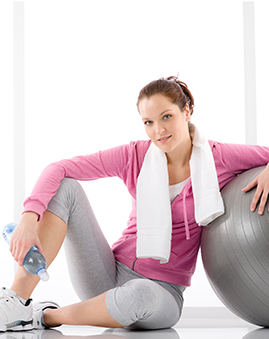
Rude Fit
Drinking it in
The human body is more than 60% water, so when you exercise in warm weather it’s important to stay hydrated. Rude Health asks the experts for their top hydration tips.
What's the problem?
“Hydration is one of the most important factors when planning training, especially during warm weather,” according to Tony McMahon in-house sports massage therapist at Nice and Natural Cootehill, Co Cavan.
“When the sun is out, you will lose more fluids through sweat when you are exercising outdoors as your body doubles its efforts to keep itself cool,” says Ainle Ó Cairealláin, strength and conditioning head coach of the Cork Senior Footballers and head coach at ACLAÍ Health and Performance gym in Douglas, Cork.
“Sweat contains a mixture of electrolytes and minerals, including sodium, potassium, calcium, magnesium, zinc, selenium, manganese, chromium and bicarbonate,” according to Dr Jay Pennock, doctor of emergency medicine and medical advisor to multivitamin supplement Oxylent. “Athletes generally need greater amounts of these than non-active people.”
How do you know you're dehydrated?
“If the colour of your urine is golden as opposed to clear,” says Ainle Ó Cairealláin, “but it’s better to maintain a healthy level of hydration all along rather than waiting for signs in the urine.”
What does dehydration do to your body?
“Being dehydrated can have a dramatic effect on your concentration and energy levels,” according to Ainle Ó Cairealláin. “More importantly, it can put your heart and lungs under additional stress. “On a more serious note, dehydration can lead to fainting and total exhaustion.”
Liz Tucker, nutritionist and health advisor to energy bar maker Wholebake says, “short-term dehydration can cause fatigue, dizziness, headaches and concentrated urine could lead to bladder pain. If prolonged or repeated over time these symptoms can lead to muscle cramps, skeletal pain and serious problems with the liver and kidneys.”
What’s the solution?
“The usual line is 2 litres of water a day but you need more if you are exercising in hot weather,” says Liz Tucker.
“Drink water before, during and after training,” says Tony McMahon. “The thing to remember is that water is not enough during hot weather as salts and electrolytes are lost in perspiration. Coconut water and electrolyte drinks that contain magnesium are very good for hydration and can prevent cramps. Also try to eat natural hydrating foods such as melons, strawberries and cucumbers.”
“During sustained exercise and heat exposure, sweating results in losses of high amounts of both fluids and electrolytes and other minerals,” says Dr Jay Pennock. “In this situation consuming a drink that replenishes electrolytes and nutrients is recommended over plain water. Read labels carefully, though, as many drinks that contain electrolytes also contain unnecessary ingredients such as sugar, artificial sweeteners, artificial colours, preservatives, and other additives that you don’t need.”
What about vitamins?
“Consistent intense training may also increase nutrient requirements by increasing metabolism, degradation rates, or bodily losses,” says Dr Jay Pennock. “Nutrients that are especially important for athletes to be aware of include B vitamins, vitamin C, vitamin D and antioxidants to protect against the free radicals that can increase during and after exercise.”
Dan’s training tips
Dan Doherty is a long distance runner from Donegal. He gives Rude Health magazine some tips for successful summer training.
- Weather – is your training and the weather conditions you train in similar to the conditions you will be racing in? Be conscious of this.
- Clothes and kit – Waterproof jackets are never truly ‘breathable’ and you will sweat a lot when wearing one. Just because it’s raining or cold does not mean you are not sweating!
- Find out which bottle/hydration system works for you. The bottle should be easily accessible and easy to use and train with.
- Learn the signs –there is a lot of guidance out there on how to recognise dehydration. Learn the symptoms and know how to deal with them.
Exercise of the issue:
The front plank. The trick to get the benefit from the front plank is to squeeze your tummy, and your glutes as hard as you can, and create some tension at the arms by pressing the elbow in to the floor. This will be much harder than your conventional style of the front plank, so instead of holding for as long as you can, hold it for 10 seconds, rest for 2 and repeat. Do this 5 times on your first attempt, and increase by 1 round of 10 seconds each time you perform the exercise. A bit of shaking is normal, so don’t be alarmed.
Click here to read other Rude Fit articles.
Click here to return to the Rude Health Magazine homepage.